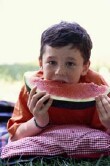
SUNDAY, March 31 (HealthDay News) — Children of highly educated parents have healthier diets, according to a new study.
Researchers looked at nearly 15,000 children, aged 2 to 9, in eight European countries — Belgium, Cyprus, Estonia, Germany, Hungary, Italy, Spain and Sweden — to examine the connection between parents’ education levels and their children’s nutrition.
The study revealed that children of parents with low and medium levels of education ate fewer fruits and vegetables and more processed foods and sweet drinks, which are high in fats and sugars. Parents with higher levels of education were more likely to feed their children foods with more nutritional value, including vegetables, fruit, pasta, rice and whole-grain bread.
The study was published in the March issue of the journal Public Health Nutrition.
“The greatest differences among families with different levels of education are observed in the consumption of fruit, vegetables and sweet drinks,” study author Juan Miguel Fernandez Alvira, from the University of Zaragoza in Spain, said in a Plataforma SINC news release.
The findings suggest that children in families with lower social and economic status are at greater risk for becoming overweight and obese, the researchers concluded.
“The programs for the prevention of childhood obesity through the promotion of healthy eating habits should specifically tackle less-advantaged social and economic groups, in order to minimize inequalities in health,” Fernandez Alvira said.
Worldwide, nearly 40 million children younger than age 5 were overweight in 2010, which highlights the need to monitor children’s diets, according to the World Health Organization.
More information
The Nemours Foundation has more on healthy family nutrition.

